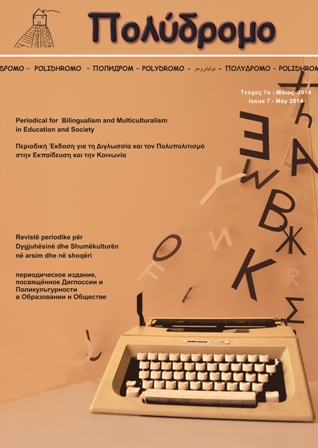The 7th issue of Polydromo attempts to demonstrate a wide range of issues relating to the transition from language and languages to “translanguaging”, challenging, once again, the boundaries between languages and giving priority to the communities of teachers, parents and children who engage in the creative process of communication through the contact of languages and cultures. The starting point of our reflection is the concept of 'translanguaging', through the perspective put forward by Ofelia Garcia (2009). Αccording to Garcia, ‘translanguaging’ is a very powerful mechanism for the construction of meaning, aiming at integrating the other perspective and transferring meanings, which enables one to cross /transcend the boundaries of language groups.
This concept, which will be addressed in the proceedings of the 3rd Crossroad of Languages and Cultures in May, helps to further explore the issues of the interaction among languages, moving beyond code switching, which is a key feature in this process. This interaction can be approached both in terms of language structure (as is in the case of code switching), and through the dialogue of the meanings encompassed in the languages in contact. Further, it is described through the voice of the bi/multilingual children and adults who express the manner in which each language finds expression through the other.
Through the teachers’ and researchers’ papers, which are featured in the 7th issue, the boundaries between languages and communities are explored, both those defined by ethnicity and those involved in the creative process of learning. The author Gizmet Kaplani (in his book Me lene Evropi) characteristically refers to the boundaries between languages, and whether they can remain untouched in today's multicultural societies, when he writes:
Sometimes my mother tongue intrudes, like an outsider, as I speak, by replacing Greek words.… It is like it wants to remind me of how fragile my relationship with Greek is, the exact minute I start to believe it is stronger than ever. Sometimes, when I'm with someone who I start to feel very familiar with, without realizing it, words in Albanian slip out. I am amazed by how stubborn my native language is.… When I write, my mother tongue often converses with Greek. As if they discuss with each other the way a picture or a concept can be formed in my head with the maximum intensity (Gazmet Kaplani, 2010: 316-317).
Editorial Committee Polydromo






